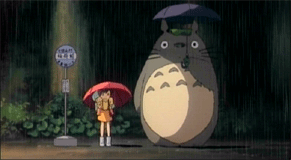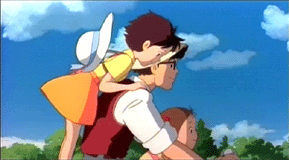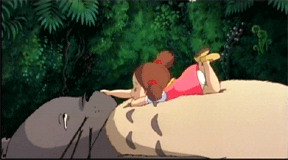My
Neighbor Totoro (Hayao Miyazaki) 1988
 No
number of superlatives that I could laud upon Hayao Miyazakiís My Neighbor
Totoro could convey the amount of joy that it brings me, but Iíll throw
out a few anyway. Itís Miyazakiís finest work! Itís the best film of 1988!
Itís the best animated feature ever made (even better than two other great animated
films of '88: Who Framed Roger Rabbit? and Akira!)! Iíve seen it countless times, but
it never loses a bit of its enchanting luster. It invigorates me with the same
sense of gleeful pleasure that most people talk about when they describe movies
like E.T. and The Wizard of Oz, but Iíd gladly take it over
either of those two classics. Thereís something special and elusive about the
wonderland Miyazaki creates, and I think he gets closer to a childís mindset
here than either of those two films do. The main reason for this is probably
because Miyazaki doesnít saddle his movie down with an adultís unnecessary
desire for plot and meaningful action. Donít get me wrong here: itís not as
if this movie has no plot, but it doesnít play out in the schematic way that
most coming of age films do. There are no big revelations, no momentous life
lessons learned, and best of all no superfluous morality. The movie takes place
in an overwhelmingly decent world, but it never harps upon that decency, so it
feels intrinsic instead of tacked on.
No
number of superlatives that I could laud upon Hayao Miyazakiís My Neighbor
Totoro could convey the amount of joy that it brings me, but Iíll throw
out a few anyway. Itís Miyazakiís finest work! Itís the best film of 1988!
Itís the best animated feature ever made (even better than two other great animated
films of '88: Who Framed Roger Rabbit? and Akira!)! Iíve seen it countless times, but
it never loses a bit of its enchanting luster. It invigorates me with the same
sense of gleeful pleasure that most people talk about when they describe movies
like E.T. and The Wizard of Oz, but Iíd gladly take it over
either of those two classics. Thereís something special and elusive about the
wonderland Miyazaki creates, and I think he gets closer to a childís mindset
here than either of those two films do. The main reason for this is probably
because Miyazaki doesnít saddle his movie down with an adultís unnecessary
desire for plot and meaningful action. Donít get me wrong here: itís not as
if this movie has no plot, but it doesnít play out in the schematic way that
most coming of age films do. There are no big revelations, no momentous life
lessons learned, and best of all no superfluous morality. The movie takes place
in an overwhelmingly decent world, but it never harps upon that decency, so it
feels intrinsic instead of tacked on.
 What
little plot there is only enhances the emotions at the heart of this character
study. Mei and Satsuki, the two little girls at the center of this story, must
learn to cope when they move to a new home without their mother, who is ill in a
nearby hospital. The movie is as concerned with their encounters with some
fanciful woodland creatures (which might be imaginary), headed by Totoro, a
flying, giant ball of fur, however. Still, even these scenes are tempered with
more intelligence and restraint than you might expect. Their meetings with
Totoro and his friends donít result in the wild adventures of traditional
animated movies, but instead gentle realizations of their fantasies that are
capable of rekindling a spark of childhood curiosity in even the most hardened
viewers. One especially intoxicating scene, which occurs about midway through
the film, where the girls plant some magic seeds, is easily one of the most
magical in all of moviedom. Other segments of the movie donít pale much in
comparison, however, since the movie maintains a consistently appealing tone,
instead of feeling like a series of disconnected set pieces. As the girls wait
alone at a bus stop in the dark, or explore the dark attic of their new home,
thereís a sense of excitement thatís unmatchable by even the biggest of
action movie explosions.
What
little plot there is only enhances the emotions at the heart of this character
study. Mei and Satsuki, the two little girls at the center of this story, must
learn to cope when they move to a new home without their mother, who is ill in a
nearby hospital. The movie is as concerned with their encounters with some
fanciful woodland creatures (which might be imaginary), headed by Totoro, a
flying, giant ball of fur, however. Still, even these scenes are tempered with
more intelligence and restraint than you might expect. Their meetings with
Totoro and his friends donít result in the wild adventures of traditional
animated movies, but instead gentle realizations of their fantasies that are
capable of rekindling a spark of childhood curiosity in even the most hardened
viewers. One especially intoxicating scene, which occurs about midway through
the film, where the girls plant some magic seeds, is easily one of the most
magical in all of moviedom. Other segments of the movie donít pale much in
comparison, however, since the movie maintains a consistently appealing tone,
instead of feeling like a series of disconnected set pieces. As the girls wait
alone at a bus stop in the dark, or explore the dark attic of their new home,
thereís a sense of excitement thatís unmatchable by even the biggest of
action movie explosions.
 My Neighbor Totoro's animation is entirely hand-drawn, and at times a bit simple, but it
still remarkably effective. Miyazakiís focus on the wonders of the natural
world makes the world that his animators draw come vividly alive. Easily the
most impressive aspect of the film, though, is the dynamism of the characters. I
donít think itís possible that actual children could deliver performances as
consistently charming as these drawings do.
Every move that Mei and Satsuki make brings them closer to us. Their bent
knees and pouting faces make them remarkably endearing, and though the movie is
always cute when showing them, never for a moment is it cloying. My Neighbor
Totoro might not be a film packed with startling adult insights or great,
serious concerns, but it artfully shows how a slightly slanted perspective and
openness to oneís imagination can reveal a world filled with endless
possibilities. Better than any other film, it captures the glorious innocence of
childhood.
My Neighbor Totoro's animation is entirely hand-drawn, and at times a bit simple, but it
still remarkably effective. Miyazakiís focus on the wonders of the natural
world makes the world that his animators draw come vividly alive. Easily the
most impressive aspect of the film, though, is the dynamism of the characters. I
donít think itís possible that actual children could deliver performances as
consistently charming as these drawings do.
Every move that Mei and Satsuki make brings them closer to us. Their bent
knees and pouting faces make them remarkably endearing, and though the movie is
always cute when showing them, never for a moment is it cloying. My Neighbor
Totoro might not be a film packed with startling adult insights or great,
serious concerns, but it artfully shows how a slightly slanted perspective and
openness to oneís imagination can reveal a world filled with endless
possibilities. Better than any other film, it captures the glorious innocence of
childhood.
* * *
* Masterpiece
06-17-02
Jeremy
Heilman